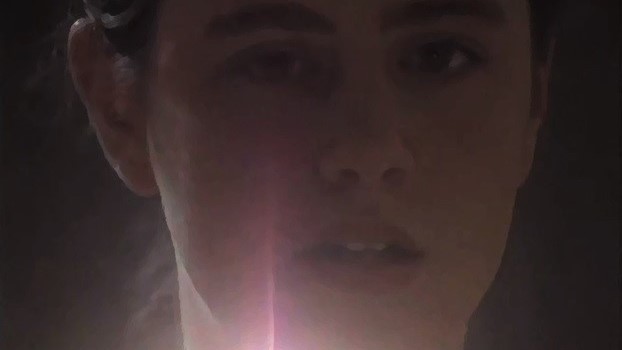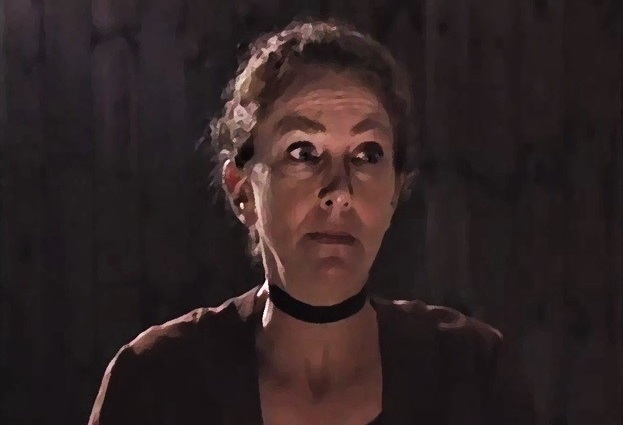 |
| Victoria Seifert as Voirrey Irving in Vanished! A Video Séance (1999). |
Each week this month, leading up to Halloween, Devin McKinney is highlighting one of his favorite ghost stories, in fiction or film. See Part 1 here.
In 1931, a tiny, furry creature with humanoid hands, voice, and intelligence was said to have materialized at Doarlish Cashen, a remote farm near the village of Dalby on the Isle of Man, two hours’ boat ride from England’s west coast. The farm’s inhabitants, the Irving family, had begun to hear scuffling and chattering in their attic, followed by a high-pitched, gibbering voice. Quickly picking up English from its hosts, the voice’s owner gave its name as Gef, and claimed to be an 80-year-old marsh mongoose brought to England in the previous century. Initially reticent, Gef soon came into view and moved about the house freely. Despite its causing no end of poltergeist mischief (midnight cacophonies, food stolen, messes left), the Irvings became attached to the creature, and it to them. Word of the family’s fantastic guest reached the village, and then the mainland, where Gef became a sensation in the popular press and psychical societies. Many visitors came, some going away convinced of the unbelievable, others that a hoax was on; Harry Price, the preeminent ghost hunter of the day, investigated with admirable pomp, holding séances and writing a book. (As much showman as scientist, Price was cagily inconclusive in his findings.) But neither solid confirmation nor a definitive debunking was presented, and after a few years, the public fascination with the case faded. So, apparently, did Gef.
Vanished! A Video Séance (1999) begins on a whistling wind and an image, only briefly held, of Doarlish Cashen – a rough, charmless place, in open country. Then we watch the textured skin of a female neck work up and down in excruciatingly slow motion to the magnified sounds of swallowing, which evolve into a series of primordial growls and roars. This wordless prelude lasts perhaps a minute, though it seems longer, long enough for you to do two things – discern that these are the sounds of a spirit entering the body and voice-box of a human host; and reflect on the abstractness of what you are seeing and hearing. In successive shots, the Irvings – father James (Julian Curry), mother Margaret (Rosemary McHale), and teenage daughter Voirrey (Victoria Seifert) – explain that they have been called up to relate incidents in their lives from years ago. Unless you know something of the backstory, you will have no idea of who these people are, or why they’ve been summoned. But you will wait to find out, because the tone is so plain and grave, the actors so fixated. This will not be a conventional spook show.
The eerie effect of Vanished! – which is either the true story of a family’s intimate experience with a cryptid, or the anatomy of a hoax, or the case history of a shared delusion – is partly in the subject matter, and partly in the rigorously simple approach. The chill that takes over as you watch is inseparable from your awareness of how much the filmmakers are doing with so absurdly little; next to it, The Blair Witch Project – which appeared the same year, and whose no-budget minimalism transformed the horror genre – looks like Hollywood. For 70 minutes, three people voicing the Irvings’ spirits simply talk to the camera, and all that holds you in place, beyond patience and imagination, are the actors’ skills and the oblique reconstruction of a strange, once-famous tale.
 |
| Julian Curry as James Irving in Vanished! A Video Séance (1999). |
In alternating shots of varying length, the three tell us about themselves and their unique relationships to Gef. Our comprehension of them emerges through a psychology of language, of tone, of what is said and what isn’t. James’s prevailing delivery is domineering, a blowhard’s self-importance, combined with a mania for order and correlated hatred of filth. Margaret’s tone is pure resentment, a seething outrage that snobs should treat her snobbishly, and an inability to admit her yearning for the romance, tenderness, and love which her husband steadfastly denies her. Voirrey is the most enigmatic of them. Unlike her parents, her spirit tells us, she is still alive, though quite old; her presence at the séance has been compelled, and she doesn’t want to be here. Mostly she speaks in a voice that, although hushed, is gravely self-assured, at once matter-of-fact and utterly haunted.
What develops – perhaps – is that the Irvings are driven to fantasize Gef by their loneliness, isolation, and virtual poverty. Each is unhappy in a different way, and incapable of being much help to the others. Each might plausibly long for some exotic visitor, some unaccountable force of nature, to enter and change his or her life. James, who even in his windswept exile fancies himself an “urbanite,” is clearly disgusted at being cooped up with two women, and speaks of Gef as he would a favored son: “A clever boy, that one.” Margaret, bitter and sharp, loathing her gossiping neighbors, enjoys imitating Gef’s shrieking way of heckling her, as if lashing herself with the memory of each abuse. Young Voirrey is looking at a long, miserable life, and seems resistant to the idea that she should be content with that dismal inheritance. Everything in sight, from nature to the fruits of civilization, is to her rich and morbid imagination a lie in disguise. Told by her father that “sprites and imps” live at the nearby creek, Voirrey investigates – finding nothing but industrial debris, “broken bits of black spring.” The school she attends has “a roof like a witch’s house,” and she sees her classmates as wolves wearing human skins. James complains that his daughter “likes birds and animals more than people”; she is, he confides, “not the full schilling . . . if you get my drift.” Voirrey is desperate for mystery, something to violate her cold, ugly world of fact and inevitability. Then Gef appears, and his coming, she says, “changed everything forever.”
 |
| Rosemary McHale as Margaret Irving in Vanished! A Video Séance (1999). |
Curry, McHale, and Seifert give us trained English acting at its best: subtle but not fussy, intelligent but not arch, invested physically and psychically but without needless mannerism. They convey a spectrum of pretension, prudery, anger, horror, disgust, and sorrow, all with nothing but their eyes and mouths, or perhaps a slight twist of the shoulders. It’s not only what they do but also how they sound: Vanished! is alive with voices. James imitates Gef’s first attempts at English speech, mewling the word “cat” over and over – and the delicate, helpless whine, especially coming from Curry’s stiff jaw and thin horizontal lips, gets your flesh crawling. At one point, Margaret sings “Carolina Moon,” a popular song Gef enjoyed singing to her. McHale’s face shows a transported love of the song, of the feeling it brings, and her voice is unexpectedly sweet and winsome. She comes to the end – and then starts up again. She closes her eyes, and her voice becomes an entranced humming. As she dissolves into her own fantasy, the humming continues. And continues. It continues until you’ve had time to accept that it is continuing; to wonder if the thin threads of mood can be held so taut for so long; and finally to feel, when it concludes, that something very strange, private, and important has passed before you.
Each character is lit slightly differently, James by a neutral half-light, Margaret more brightly and from below, making her look demonic at times. Voirrey’s light comes from the side and behind, so that her features, though discernible, always seem veiled, like her inner life. She’s the one who first reports seeing Gef – and the one we can most readily imagine dreaming him into existence (her parents electing, for his or her reasons, to engage with the fantasy). “I’m a ghost in the form of a weasel, and I’ll haunt you.” Voirrey whispers these words, which she claims Gef has whispered to her through the rafters, in the dark of the night and howl of the wind. Spoken plain, the words would mean nothing beyond their surfaces: you would either accept or reject them, believe or disbelieve that such things could happen in the world, that they did happen at Doarlish Cashen in the early 1930s. But because the words are whispered, susurrated through the veil of Voirrey’s image, they are heard for what they may truly be – not a statement but a seduction, and a threat. The words of a demon lover.
 – Devin McKinney is the author of Magic Circles: The Beatles in Dream and History (2003), The Man Who Saw a Ghost: The Life and Work of Henry Fonda (2012), and Jesusmania! The Bootleg Superstar of Gettysburg College (2016). Formerly a music columnist (The American Prospect), blogger (Hey Dullblog), and TV writer (The Food Network), he has appeared in numerous publications and contributes regularly to Critics At Large and the pop culture site HiLobrow. He is employed as an archivist at Gettysburg College in Gettysburg, Pennsylvania, where he lives with his wife and their three cats. His website is devinmckinney.com.
– Devin McKinney is the author of Magic Circles: The Beatles in Dream and History (2003), The Man Who Saw a Ghost: The Life and Work of Henry Fonda (2012), and Jesusmania! The Bootleg Superstar of Gettysburg College (2016). Formerly a music columnist (The American Prospect), blogger (Hey Dullblog), and TV writer (The Food Network), he has appeared in numerous publications and contributes regularly to Critics At Large and the pop culture site HiLobrow. He is employed as an archivist at Gettysburg College in Gettysburg, Pennsylvania, where he lives with his wife and their three cats. His website is devinmckinney.com.
No comments:
Post a Comment